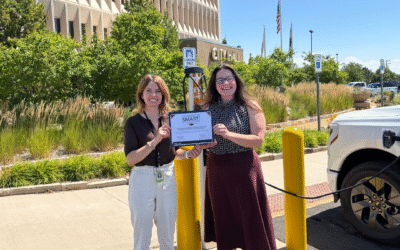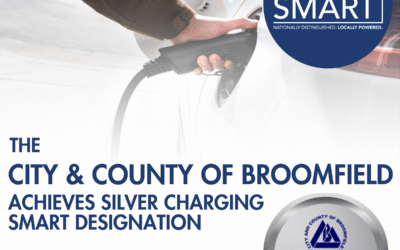
Location: Broomfield, CO
Fleet Type: Local Government
Narrative
Broomfield residents, like many Coloradans, highly value the natural environment and consider it a primary factor in contributing to quality of life. Knowing that, the City and County of Broomfield’s environmental stewardship vision states: “Broomfield is a leader in implementing environmental stewardship policies that help create a desirable and sustainable community now and for future generations.”
Starting from this vision and community values, Broomfield City Council set ambitious, community-wide greenhouse gas (GHG) emissions reduction targets equivalent to the statewide targets set out in House Bill (HB)19-1261: 26% by 2025, 50% by 2023, and 90% by 2050.
Following adoption of these targets, Broomfield staff worked with Broomfield’s Advisory Committee on Environmental Sustainability (ACES) and technical assistance partners to engage the community and develop a baseline GHG inventory and action plan. Broomfield found that transportation accounted for nearly one-third of Broomfield’s baseline (2017) emissions.
The City and County of Broomfield’s (Broomfield) Fleet Division, using the GHG emission reduction targets, set out to develop a fleet vehicle replacement plan to reduce carbon emissions with a sustainable fleet. Among several considerations and compelling reasons to consider sustainable strategies, the Broomfield Fleet focused on reducing operational costs by improving fuel economy, modernizing the fleet through electrification and rightsizing, and remaining compliant with applicable emission regulations.
Based on these principles, the Public Works Department developed an initial 5-year plan showing vehicle replacement through 2026. The plan is based on criteria including proposed price and replacement time. Within that plan, staff has also identified proposed municipal charging sites for charging fleet electric vehicles (EVs). Contingent on the replacement criteria and considering technology advances and operational specific requirements, the goal for electrification of the Broomfield fleet is 2050.
Outputs and Outcomes
Broomfield’s Fleet vehicles inventory currently consists of approximately 450 vehicles which requires a significant investment to convert to a sustainable fleet. Beginning in 2020 using the 5-year plan, staff implemented sustainable vehicles into Broomfield’s inventory with the purchase of five hybrid vehicles. Since 2020, Broomfield has added another 31 hybrid vehicles to the fleet. Following these initial investments, Broomfield’s EV inventory currently consists of nine vehicles, two Ford Lightnings and seven E-Transits, along with 4 total charging ports (and growing) to accommodate EV expansion in the future.
In an effort to ensure financial sustainability and maximize available budget funding to achieve Broomfield vehicle emission reductions, in January 2021, Broomfield partnered with Drive Clean Colorado to conduct an audit on Broomfield’s fleet to identify which vehicles were the highest GHG emitting. Now in 2024, Drive Clean Colorado and Broomfield continue diligently working together to stay up to date with meeting sustainability goals.
Through this audit, fleet staff was able to ensure the best targets for replacement with alternative fueled vehicles. For instance, petroleum-powered golf carts were recognized as one of the highest GHG emitting vehicles in Broomfield’s inventory. In 2023, Fleet Maintenance began replacing the current petroleum-powered carts with electric units and plans on having full implementation by 2025.
Best Practices & Lessons Learned
- Broomfield plans to gradually replace its fleet vehicles and equipment with EVs when due for replacement.
- With the recent market shortage and lithium supply chain issues, government entities are struggling with procuring EV and hybrid vehicles. In addition, it can take up to two years to receive a new vehicle after ordering.
- Vehicle manufacturers are gravitating to selling local inventory to the private sector due to the substantial discounts government municipalities receive.
- Vehicle prices have increased 30% or more in the past three years. This makes it difficult to forecast vehicle replacement costs, annual budgets and opportunity to procure other vehicles when cancellations arise.






